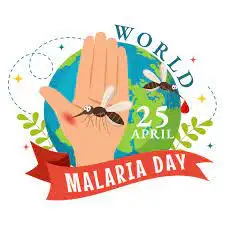World Malaria Day 2025: Top 5 Practical Tips to Protect Yourself from Mosquito Bites
Every year on April 25, World Malaria Day is observed to raise awareness about the global fight against malaria. Despite medical advancements, malaria remains a serious public health challenge, especially in tropical and subtropical regions of Africa, Asia, and parts of South America. According to the World Health Organization (WHO), malaria still affects millions each year, with children and pregnant women being among the most vulnerable groups.

Malaria is caused by Plasmodium parasites, transmitted to humans through the bites of infected female Anopheles mosquitoes. While the disease is preventable and treatable, lack of awareness, inadequate preventive measures, and insufficient access to healthcare continue to fuel its spread. The good news? A few simple precautions can significantly lower your risk of getting bitten by mosquitoes and reduce malaria transmission.
On the occasion of World Malaria Day 2025, we’re sharing the top 5 effective and practical tips to reduce your exposure to mosquito bites and keep you and your family safe.
1. Use Mosquito Nets While Sleeping
One of the most effective ways to protect yourself from mosquito bites is by using insecticide-treated bed nets (ITNs), especially at night. Mosquitoes that carry the malaria parasite are usually active between dusk and dawn, making night-time protection crucial.
- Why it works: Nets create a physical barrier while the insecticide kills or repels mosquitoes.
- Pro tip: Ensure the net is tucked in properly and doesn’t have any holes. Replace worn-out nets regularly.
Governments and health organizations have long promoted ITN distribution campaigns in malaria-endemic regions, but many people forget to use them consistently. Making bed nets a nightly habit can save lives, especially in households with children and elderly members.
2. Apply Mosquito Repellents
Using mosquito repellent on exposed skin and clothing is another important line of defense. Repellents containing DEET, picaridin, or oil of lemon eucalyptus have been shown to be effective in repelling mosquitoes.
- How to use: Apply as directed on the label. For children, use age-appropriate repellents and avoid hands and face.
- When to use: Always apply repellent when going outdoors in the early morning or evening hours.
Natural repellents like citronella or neem oil can also offer limited protection, though they may not be as long-lasting as chemical-based products. In high-risk areas, it’s best to opt for products tested and approved by health authorities.
3. Wear Protective Clothing
Your choice of clothing can go a long way in reducing mosquito bites. Long-sleeved shirts, full-length pants, and socks provide a physical barrier, especially when outdoors during peak mosquito activity times.
- Choose light-colored clothing: Mosquitoes are attracted to dark colors, so wearing whites, pastels, or khakis can help.
- Treat clothing with insecticides: Products like permethrin-treated clothing are available and can repel mosquitoes effectively.
In many communities, particularly in warmer climates, wearing long clothing may seem uncomfortable. However, breathable cotton fabrics and loose-fitting garments can help reduce discomfort while still offering protection.
4. Eliminate Mosquito Breeding Sites
Mosquitoes breed in stagnant water, and even small amounts — such as water in a flower pot or discarded tire — can be enough. Reducing mosquito populations near your home is one of the most effective preventive steps.
- Do this weekly:
- Empty and scrub water containers.
- Clear clogged gutters and drains.
- Cover water storage tanks properly.
- Community involvement: Collective efforts, such as local clean-up drives, are essential to control mosquito breeding at a larger scale.
This step not only protects your home but also contributes to the wider public health effort by lowering mosquito density in the community.
5. Install Physical Barriers
Making your home mosquito-proof is another key prevention strategy. Installing window screens, door nets, and ceiling fans can reduce the number of mosquitoes indoors.
- Screens and meshes: Ensure they are in good condition without holes.
- Close doors and windows during the evening to limit entry of mosquitoes.
- Use fans or air conditioning, as mosquitoes prefer still air and humid environments.
Simple home modifications can drastically reduce the chances of bites inside your home — where most people spend the majority of their time.
Bonus Tips: Boosting Community Awareness and Prevention
While individual protection is important, malaria control requires a community-level approach. Education campaigns, access to proper diagnosis, and treatment facilities are all vital.
- Encourage your local health authorities to conduct regular fogging or spraying during the breeding season.
- Support and participate in awareness programs and vaccination campaigns where available.
- If you’re traveling to a malaria-endemic area, consult a doctor in advance about anti-malarial medication and other preventive steps.
Final Thoughts
This World Malaria Day, it’s essential to recognize that prevention is better than cure — and in the case of malaria, it’s life-saving. With consistent personal protection, cleaner surroundings, and better awareness, malaria can be defeated.
Reducing mosquito bites isn’t just about comfort — it’s about protecting lives. Let 2025 be a year where more communities commit to malaria prevention and work towards a malaria-free future.






